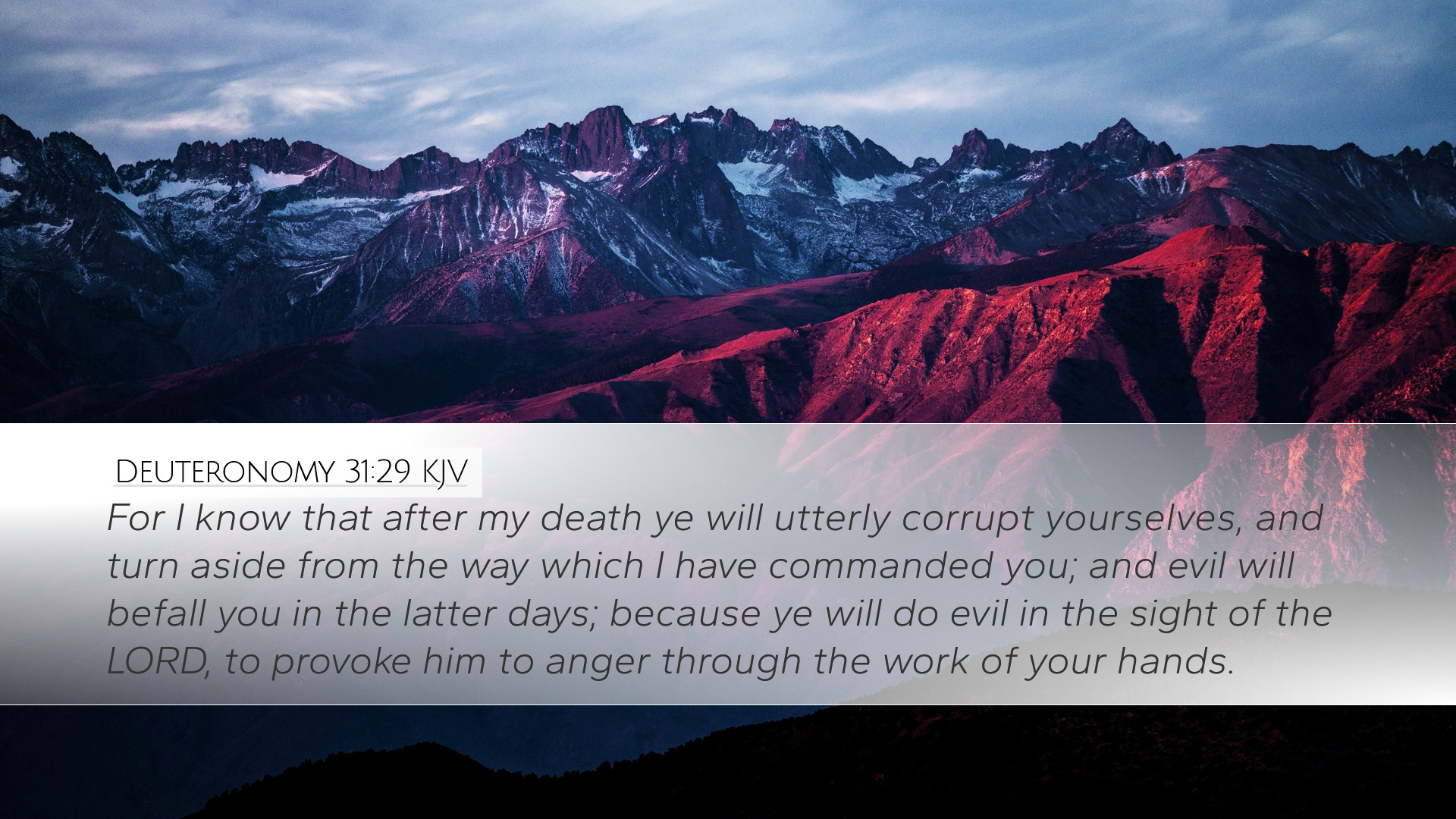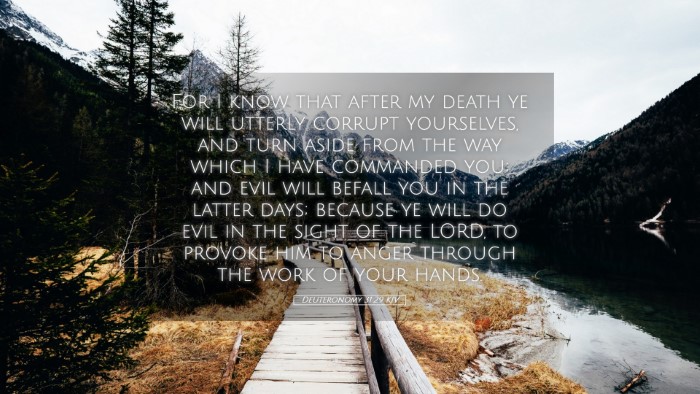Bible Commentary on Deuteronomy 31:29
Verse Reference: Deuteronomy 31:29 - "For I know that after my death ye will utterly corrupt yourselves, and turn aside from the way which I have commanded you; and evil will befall you in the latter days; because ye will do evil in the sight of the LORD, to provoke him to anger through the work of your hands."
Contextual Background
The book of Deuteronomy serves as a farewell address by Moses, who stands at the threshold of the Promised Land. As he prepares to pass leadership to Joshua, Moses reflects on the future of Israel, underscoring the challenges that lie ahead for a people prone to disobedience. This verse encapsulates his foreboding concern for Israel's spiritual health after his departure.
The Prophetic Insight of Moses
Moses as a Prophet: According to Albert Barnes, Moses foresaw a deep moral decay among the Israelites after his death. His prophetic warning reflects a profound understanding of human nature and the tendencies of the people he had led through the wilderness.
Human Nature: The fact that Moses expresses this concern indicates a keen awareness of the inclination towards sin and rebellion inherent in mankind, particularly when left without strong leadership.
The Consequences of Disobedience
- Corruption of the People: Matthew Henry notes that Moses predicted a "corruption" that would lead the Israelites away from God's commandments. This denotes a spiritual deterioration that often accompanies periods of prosperity.
- Turning Aside from Divine Command: The phrase "turn aside from the way" suggests a deliberate choice to forsake God's instructions. Adam Clarke emphasizes that this rebellion is a willful act against divine law, highlighting the accountability of Israel as God's chosen people.
Divine Anger and Judgment
Provoking God: The latter part of the verse warns of provoking God's anger through their actions. This aspect of divine displeasure illustrates the seriousness of the covenant relationship between God and His people. Henry points out that the "work of your hands" refers to idolatry and practices that are an affront to God’s sovereignty.
Evil in the Latter Days: The mention of "evil will befall you in the latter days" serves as a specific prophecy regarding Israel’s future. Clarke posits that this is a foreshadowing of the consequences they will face—including invasions and exile—if they reject God's commandments and pursue sinful ways.
Theological Reflections
The Nature of Apostasy: Understanding apostasy involves recognizing the often gradual journey away from faithfulness to God. As detailed by Barnes, the Israelites’ eventual disobedience signifies a broader truth about humanity's spiritual fickleness and the dangers of complacency.
Hope Amidst Warning: While the warnings are severe, one can find in the text a reminder of God’s faithfulness. Even as Moses warns of rebellion and judgment, there remains the opportunity for repentance and renewal, a theme echoed throughout Scripture.
Practical Applications for Today
- Guarding Against Complacency: Just as the Israelites were warned about future disobedience, contemporary Christians must be vigilant against complacency in their faith. Regular engagement with Scripture and community can counteract the drift away from God’s commands.
- The Importance of Leadership: The transition of leadership from Moses to Joshua illustrates the need for godly leaders to guide God’s people. Pastors and church leaders today must provide the shepherding and teaching necessary to maintain spiritual fidelity.
- Understanding God’s Holiness: Reflecting on the seriousness of provoking God’s anger serves to remind believers today about the holiness of God and the reverence with which they should approach their relationship with Him.
Conclusion
The depth of Deuteronomy 31:29 encapsulates a poignant warning from Moses that transcends time. It serves as a reminder of the fragile nature of faith and the critical need for vigilance in following God’s commandments. Through understanding this verse, pastors, scholars, and students can glean insights for both personal and communal faith journeys, fostering a deeper commitment to God’s ways amid the challenges of life.


